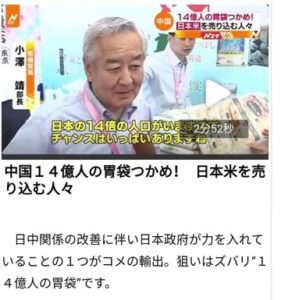2018.10.25
Food news
An interview with our Food Department Manager was reported in TBS “N Studio.”
"Win the hearts of 1.4 billion people in China through their stomach! People who promote Japanese rice"
An interview with our Food Department Manager was reported in TBS "N Studio."

Win the hearts of 1.4 billion people in China through their stomach! People who promote Japanese rice
One of the efforts being made by the Japanese government with the improvement of Japan-China relations is rice exports. Its aim is the "stomachs of 1.4 billion people," of course.
In a cooking class in Beijing, Chinese people are learning how to make rice ball for the first time with a serious look on their faces.
"I can't do it well," a woman said.
Safe and reliable Japanese rice is gaining attention in China, where people are becoming increasingly health conscious.
"Japanese rice has a uniform grain size and a chewy texture," a woman said.
Q. How is it compared to Chinese rice? "Japanese rice is more springy," a woman said.
The annual rice consumption in China is approximately 150 million tons, which indeed accounts for 30% of the world's rice. 4 million tons of that amount are imported, but only 300 tons are from Japan.
"This is the rice section of a supermarket in Shanghai. As you can see, there is an array of Japanese rice here," a reporter said.
Many of the products sold in the section are produced in China, and their prices are less than half the price of the imported rice. "
They are not made in Japan, but have Japanese quality," the reporter said.
Japanese rice and Chinese rice are labeled in a confusing manner, but it is said that the difference is obvious once you actually eat both.
"They are completely different. The customers say so. We used Japanese rice made in Shanghai before, but there were dark spots on it, so we couldn't use it," a restaurant manager said.
In China's largest food expo held in Shanghai, many buyers showed interest in Japanese rice.
"Is this rice organic?" a buyer asked. "Pesticides are rarely used in Japan," Manager of Itabashi Trading Co., Ltd. said.
Itabashi Trading Co., Ltd. sells Japanese rice in China, and the volume of products handled by the company has increased by five times in the last five years.
We aim to further expand our sales channels, but the prices are still the problem.
"This 2-kg package of rice is very expensive," the buyer said.
In order to export Japanese rice to China, it was required that processes such as rice polishing be performed in the facility specified by the Chinese government. This inevitably led to higher prices due to the expenses and transportation cost. This situation changed drastically in May this year.
When Premier Li Keqiang visited Japan, he agreed to increase the number of factories specified for rice polishing operation by adding two more facilities to the existing one.
Our sales representatives are eager to rapidly promote our products, taking advantage of the improved Japan-China relations. "China's population is 14 times larger than Japan, so there are many opportunities," Yasushi Ozawa, Manager of Itabashi Trading Co., Ltd. said.
Thank you very much.



